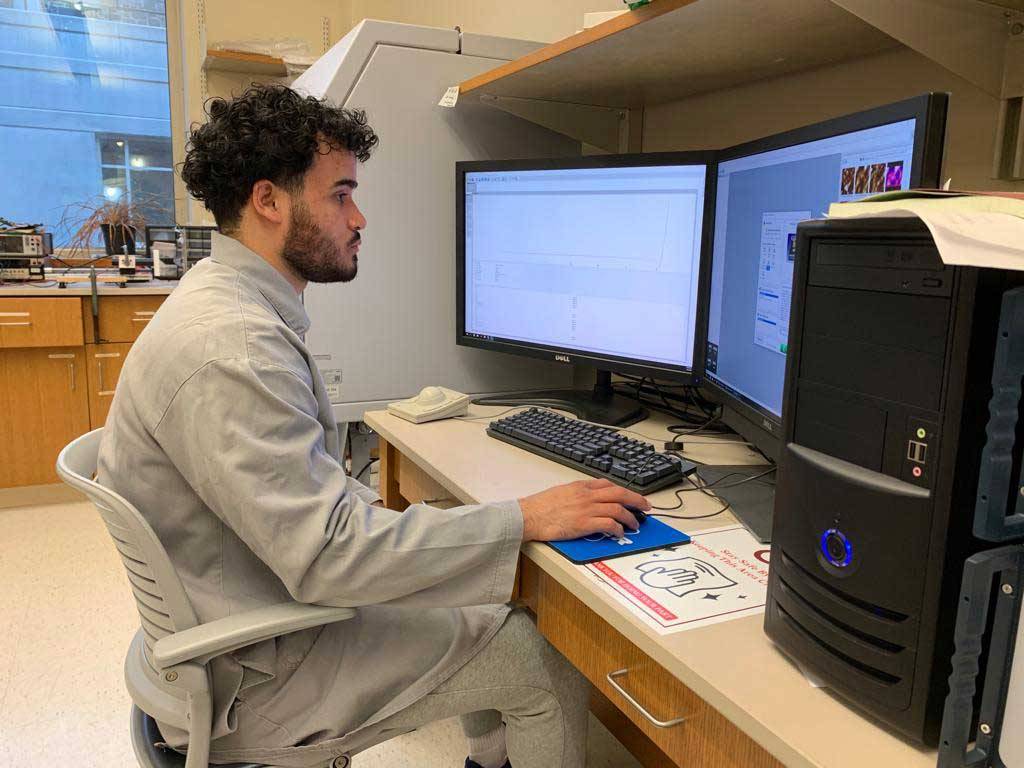After a demanding, yet fulfilling, academic experience as a physics major at Colgate, Jeiko Pujols ’23 is ready to take another step toward a career as a researcher in electrical engineering.
Pujols, who was born in the Dominican Republic and moved to New York City at age 11, will begin a PhD program in electrical and systems engineering at the University of Pennsylvania next fall.
He made the decision from a list that included offers from Washington University in St. Louis, the University of Michigan, Columbia, and Northwestern.
To garner interest from various institutions was a proud moment for Pujols, who has worked tirelessly for nearly four years to become a top-five student in an outstanding class of 24 physics and astronomy majors. He did it while taking on computer science as a minor.
“I always tend to underestimate my abilities,” Pujols said. “I was pretty happy that I could get into several graduate schools.”
When Pujols graduates in May, he’ll become the first in his family to earn a college degree. But he won’t be the last. He has two younger brothers who plan to follow in his footsteps.
“My mom is one of my biggest fans,” he said. “She’s a single mother of three boys. She’s really happy to see me graduate. That’s all she ever asked of me — to graduate from college.”
Looking back at his Colgate experience, another major achievement stands out.
Last summer, he and Assistant Professor of Physics and Astronomy Ramesh Adhikari co-wrote a research article that was published by Nano Select, a science publication journal.
The article, titled “Highly Rigid and Transparent Supramolecular Fibrils of Tyrosine,” took nearly a year of exhaustive research to write.
“It was really motivating for me to see that,” Pujols said of watching a publication accept his work. “It shows me that being a researcher is something I can do. It was something I was really proud of.”
Pujols was in high school when he discovered his love for math and science. He enjoyed research and computer science and developed an interest in building technological devices. Engineering became his favorite subject.
When searching for a college, Pujols wanted an institution with a robust science program on a campus that wasn’t too far from home. It was also crucial that Pujols received a strong financial aid package, which Colgate provided.
In the summer before starting at Colgate, he took two full-credit courses (Introduction to Sociology and Cancer Biology) as an OUS Scholar. Through the program, he met several incoming students who became good friends.
Pujols majored in physics, and took every course that correlated with engineering. While he didn’t have a background in physics, his skill in math and exemplary work ethic allowed him to excel.
“Physics is pretty challenging,” he said. “I had to really focus on my work and dedicate myself to my studying. I was always able to manage and get through it. It helped me develop into a better student and better academic.”
In the rare moments that Pujols had free time, he took advantage of the outdoor opportunities that are in abundance in the region. He developed an interest in mountain biking and skiing.
He’s also made the best of the resources available in the physics department. He spent the summer of 2022 doing research at Washington University in St. Louis as part of an internship.
Pujols is thankful for the support he’s received from faculty, especially Adhikari and his adviser, Professor of Physics Kenneth Segall. Both instructors had major roles in his development as a student.
“The professors are very caring people and really helpful,” Pujols said. “They are willing to take the time to help students with anything they need.”
Segall has gotten to know Pujols from the many visits to his office.
“He would always come to office hours to reinforce his understanding of the material,” Segall said. “Even if he ‘got’ the right answer on homework, he always wanted to make sure he understood the broader implications of the problem and how it was a piece of a bigger picture.”
The professor has also taught Pujols in four courses — including Electronics (Physics 336), where Pujols and a classmate created a project that was one of the best the professor had ever seen.
The project, called “1v1 Snake Death Battle,” was a game made with an 8x8 color LED board. Just to get a single LED to light up on the board is hard enough, but Pujols and his project partner were able to create a dynamic, two-player game with it, Segall said.
“It involved a lot of multiplexing and demultiplexing, arduino programming, and a whole bunch of wires,” Segall said. “It ranks as one of the two or three best projects I have had in my 10 years of teaching Electronics.
“He has a clear passion for science, which is coming through more and more as he matures,” Segall said.
